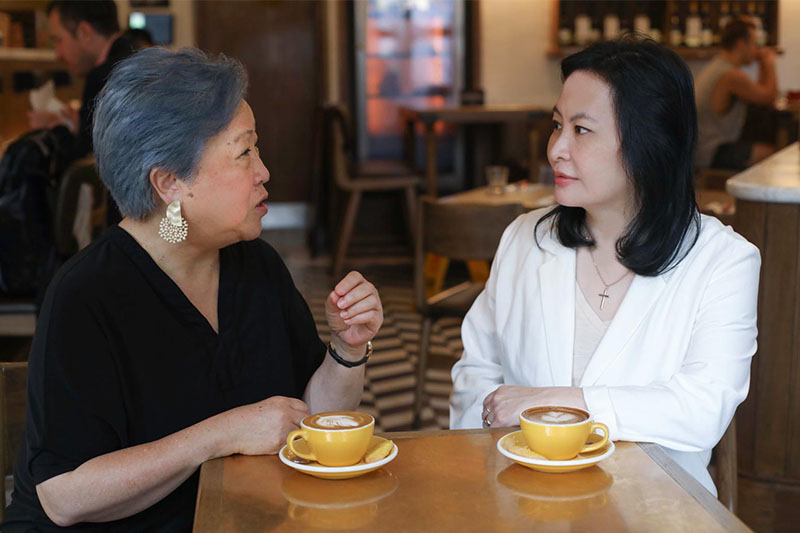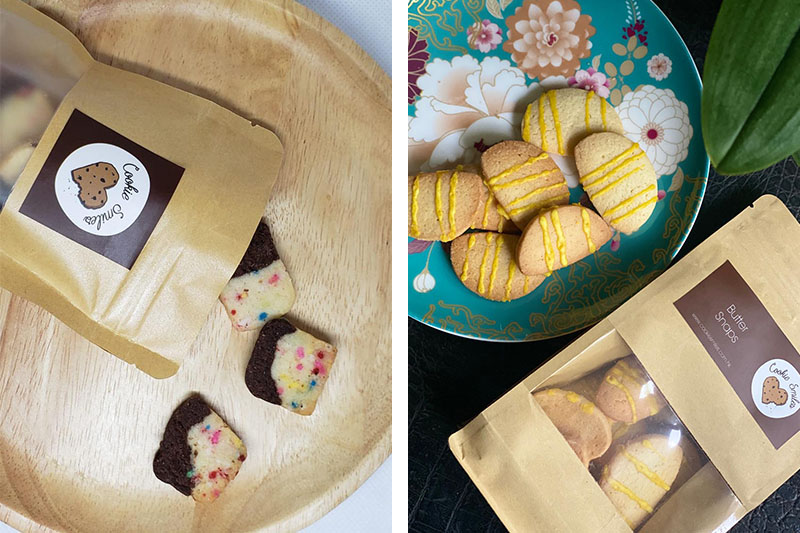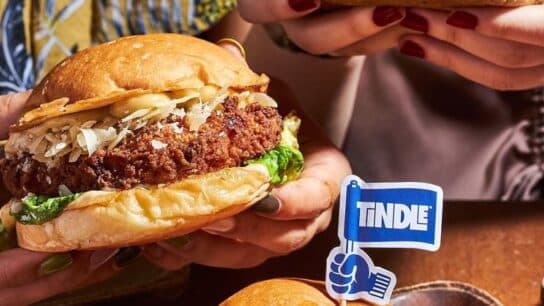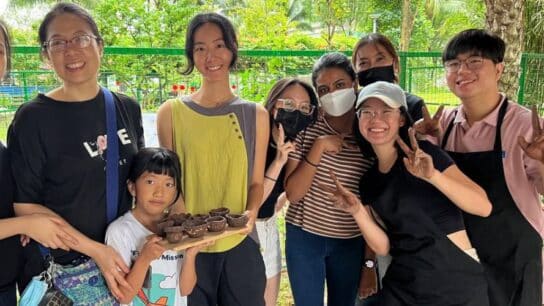Social enterprise Cookie Smiles is supporting the most vulnerable members of society with an unorthodox – and delicious – fundraising strategy: cookies.
Hong Kong, Asia’s world city, has struggled to cope with the COVID-19 pandemic, with social distancing measures leaving restaurants and retail shops emptier than ever before.
With residents facing a 15-year high unemployment rate of 6.2%, vulnerable members of society are most affected by the pandemic – migrant workers often can’t access adequate protective equipment and many service workers don’t have the economic resources to turn down jobs that put them at a higher risk of catching the virus.
Social enterprise Cookie Smiles, founded in June this year, is trying to change the status quo, fundraising through cookies to support disadvantaged communities.
Led by avid philanthropists Jo Soo Tang, Strategic Advisor of Food Made Good HK, and Agnes Chin, President of Edible Artists Global Academy Association and Director of Complete Deelite, Cookie Smiles is retraining workers, creating jobs, and supporting other NGOs in Hong Kong.
Here, we talk to Jo and Agnes to learn more about their initiative and how they hope to give people the opportunity to support themselves, retaining their dignity along the way.

Cookie Smiles Co-Founders Agnes Chin (left) and Jo Soo Tang (right)
Were there any personal reasons that drove you to launch Cookie Smiles?
Agnes: This particular form of social enterprise has been in my heart for many many years, and it was just a matter of the right timing and the right person. I think COVID gave me the time needed to really plant this idea, and I just shared it with Jo during our monthly catchup lunch because of her background in charity work, then yeah, one thing just led to the other!
Jo: I was at that stage in my life where I was getting frustrated with the voluntary work I was doing because I felt like there was a lot of red tape. There were so many processes and procedures involved and so many people with different experiences and opinions that look at things differently from you, so you couldn’t execute things as quickly as you would like. Then COVID came along, which really gave me the time to sit back and think about what I was doing with my life. When Agnes told me about her idea, I was really hooked on it because with a social enterprise, you can be who you want to be and do things quickly. So, I decided it was time for me to finally have my own thing and be more focused on my work, rather than helping so many different charities.
Why did you choose to fundraise through cookies?
Agnes: I love cooking and I love baking cookies. When I was thinking about how to contribute to society, I wanted to help by doing something that was within my ability, and cookies are a great medium for this – it’s just something that’s so simple and organic. To me, starting Cookie Smiles is a matter of personal fulfilment. We are building everything one grain at a time with our own efforts, commitment, and finances. It’s a product of passion and love.
Jo: I don’t think there is anyone that doesn’t like cookies, especially in Hong Kong where people here just love to eat. For me, it is also a sort of comfort food – it brings back memories of my childhood in Australia where we used to go round schools selling cookies and chocolate bars. Cookies are just so easy to sell because there are so many different types of cookies. Coming from a background where I’ve worked for charities and NGOs for so many years, I’ve always been stuck in a boardroom with board members talking about these massive programmes. But, now I really want to focus on something that goes back to ground zero and takes more of a hands-on approach, so I think baking cookies was the exact thing that was missing in my voluntary book.

Can you tell me more about Cookie Smiles’s charitable impact?
Agnes: My area of expertise is in developing the product and targeting who we can support in terms of providing jobs and retraining, whereas Jo is in charge of choosing which charities to support. We now have Ah Mei and Wei Wei as part of the Cookie Smiles team, who we have re-trained as apprentice bakers after they were laid off as line cooks working at an Asian food court.
Jo: For our charity work, 20% of our annual profits go to Splash Foundation and Hong Kong Down Syndrome Association. I chose Splash Foundation because the organisation really focuses on this big migrant worker community – domestic helpers included, and it’s important to recognise the day-to-day work migrant workers do to help our families. On top of that, I had actually been on the board of Splash Foundation for over four years. When I decided to start Cookie Smiles with Agnes, I also decided to resign from Splash. But, I still wanted to continue my relationship with them so this was a way for me to do so. As for The Hong Kong Down Syndrome Association, I just felt like this has always been a group of people that Hong Kong pretty much neglects – you just don’t see a lot of news about the Down Syndrome kids, so I wanted to bring this group of people into focus.
How has COVID-19 negatively affected NGOs and socially disadvantaged demographics?
Jo: It’s a very, very tough environment for NGOs at the moment. A lot of the ways for NGOs to raise money are through events like gala dinners, which can’t be held during the coronavirus. A lot of companies and organisations also stopped with the charitable work they are doing. Maxim’s has stopped donating their surplus bread to the community because of COVID, but there are a bunch of people who rely on Maxim’s extra bread every day as their meals. Current coronavirus restrictions also mean McDonalds doesn’t do sit-ins after 6, so many homeless people now don’t have a place to stay at night. It’s a very difficult time for organisers right now, let alone the community of people that rely on these organisations to live.
Agnes: I think COVID-19 has made it particularly difficult for people in the service industry. They’re often being kicked out and they can hardly find a job, and many go back to basic ways to earn extra money like cutting hair for their neighbours. That’s essentially how I want to help with Cookie Smiles – we retrain these people so they can use these skills to bake and sell their products through our network, and if they’re not licensed, we can let them use our kitchen.

How developed is the philanthropic scene in Hong Kong? Are people willing to donate?
Jo: Hong Kong has so much wealth; it’s almost crazy, but people have always been very giving. We have over 10,000 NGOs in Hong Kong – that’s a lot for such a small place. Even for Cookie Smiles, we have been very lucky because retailers and customers are very welcoming and supportive of our social enterprise. They like how warm and simple it is.
As for the government, I think it has a very difficult role in terms of what it should provide and how it should provide. As giving as Hong Kong people can be, Hong Kong is also one of those places where the rich and poor live so closely to each other, and there’s just an overkill of people we need to help. The government has got a huge undertaking, so I think they’re doing brilliantly and I wouldn’t want to criticise their work at all.
What do you think is the best way to help the needy and the disadvantaged?
Agnes: I think we need to help people to help themselves. We cannot always be dependent on the government or charity organisations. In fact, there are a lot of hardworking people out there who do not want money handouts. They just want to be able to work, but don’t have the opportunities, skills or abilities, perhaps because of their age which means they cannot work long hours or stand the long laborious work in restaurants. Rather than relying on the government to do this or that, people – particularly the young and able – need to move with the cheese when things change and be trained with new skills so they can contribute to society.
Jo: To further elaborate on what Agnes said, there are so many crafts that people could take on, from hairdressing to tailoring. Baking is also a big one because not everyone needs to be a pastry chef to take on baking. Yet for me, I think that charity starts from the smallest actions, like the way you treat people at your building, or your cleaning lady, or your domestic helper.
As for organisations, they should be ready to come out and do a little bit extra. That could be doing an extra batch of baking or giving out something as simple as lunch boxes because people just don’t even have a meal, let alone a job.
What’s in the future for Cookie Smiles?
Agnes: We’re in the process of finalising a new product called Woof Twisters, which will hopefully be launched by early September. We decided to do dog treats because just as humans want to enjoy treats, dogs want to enjoy treats too. We’ve tested it on three dogs, and they wolfed it up!
Related Articles
The Man Behind Movember: Founder Travis Garone on Authenticity, Naivety & Passion
Medical Pantry: Australian Startup Tackles Healthcare’s Waste Problem
LUÜNA: Tackling Stigma, Shame & Silence Around Periods Across Asia





